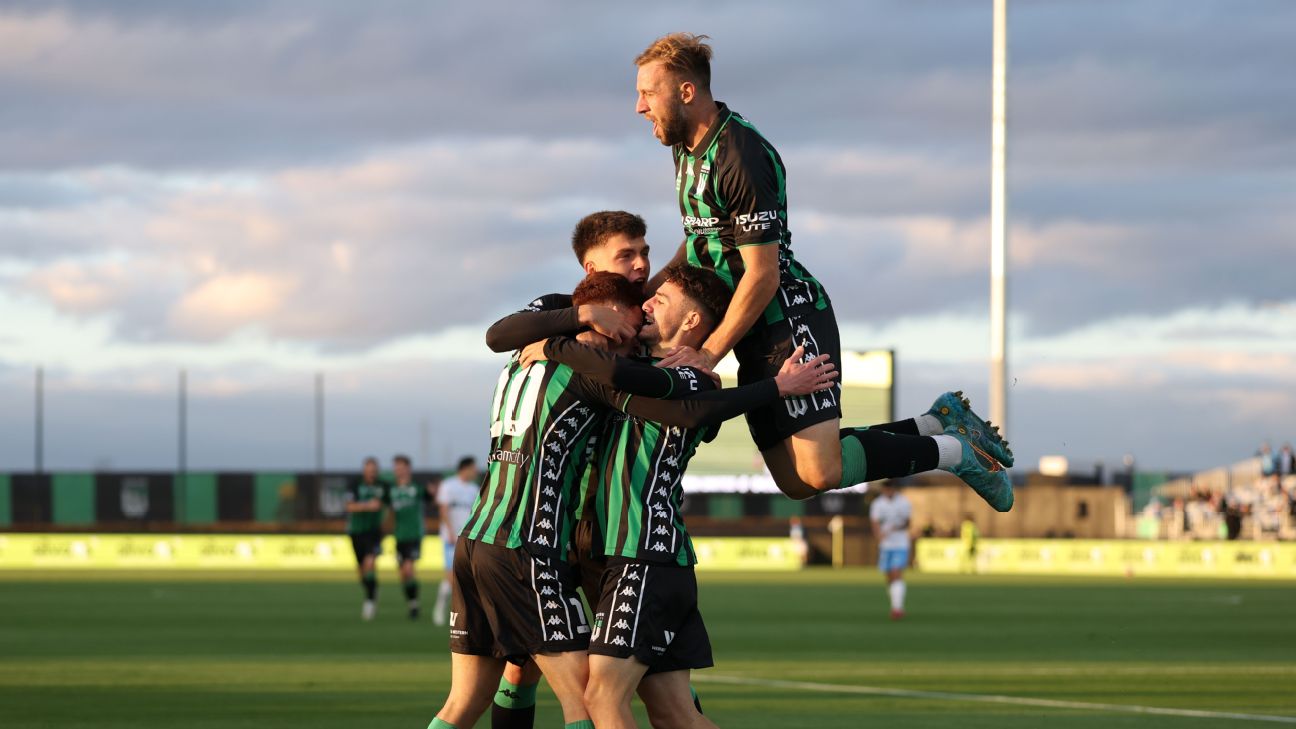The group tapped to purchase Western United has told ESPN that an “infrastructure play” drove interest in their new acquisition and that they’re confident a proclaimed near-$AUD 100m investment will address the crisis-stricken A-League club’s financial woes. A much anticipated stadium, however, faces further delays.
United parent Western Melbourne Group (WMG) announced on Friday that the Kaminski family, through the KAM Melbourne subsidiary of their KAM Sports business, was acquiring a controlling stake in both the club and WMG after a year-long process. From Minnesota, the Kaminski’s money is derived from real estate, with patriarch Maciek, chair of KAM Sports, the founder of Talon Real Estate.
Speaking to ESPN, Maciek’s son Mikhail, who serves as CEO of KAM Sports, said his family were acquiring “north of 65%” in WMG, with scope to increase that stake, and that the scale of the investment will be “will be about 100 million, give or take, Aussie dollars.”
WMG’s initial awarding of an A-League licence during the 2018 expansion process centred on plans for a public-private partnership with Wyndham City council to develop a vacant 63 hectares in Melbourne’s west, with a new stadium that would host United at its core. But progress has been slow, with only a training base at Ironbark Fields built and WMG failing to hit milestones that would see Wyndham transfer them the land.
The deal announced on Friday still requires the approval of the APL, Football Australia, and the Foreign Investment Review Board before funds can be released.
“We are in the process of all of those [approvals] and we feel comfortable with where we are in those processes to come public with [the deal],” said Mikhail Kaminski.
“To be very blunt, with everything going on at the club, I think it’s going to be seen as, hopefully, we can bring some good value and help.”
Outside of real estate, the Kaminskis are most known for their attempts to purchase Premier League side Everton from Farhad Moshiri, first as part of a consortium before launching a solo attempt in 2022. Negotiations ended in early 2023, with reports saying Maciek had “stepped back”. Vozpópuli also reported that the family had an interest in La Liga power Atlético Madrid.
Lesser known are attempts to purchase Belgian club K.V. Kortrijk, Greek side Panetolikos FC and Swiss outfit AC Bellinzona. In the case of Kortrijk and Panaitolikos, talks progressed to the point that the Kaminskis were unveiled as new owners, only for the deals to collapse amid allegations of missed payment deadlines and duplicity in both Belgium and Greece.
“Each opportunity had particular circumstances which we were unable to overcome and complete the transaction,” Kaminski said in a response to follow-up questions from ESPN.
For United, a promise of incoming capital comes at a critical time. In March, the ATO filed a winding-up order in federal court against WMG’s property and footballing companies, scheduled to be heard on May 14, and on Monday, the company of United director and former Socceroo Steve Horvat, who the AFR reports is a 4.4% owner of WMG, was placed into liquidation.
Further, FIFA imposed a ban on United’s men from registering new players for the next three transfer windows on Wednesday, over what the Sydney Morning Herald has reported as a dispute with former player Aleksandar Prijović. A United spokesperson told ESPN the club had “already put steps in place to resolve this as soon as possible,” and, per sports consultant James Kitching, “The only way to lift that ban is to make full payment”.
“That is the first order of business for the entire company,” Kaminski said of the financial issues. “Before you can build, you need to have a solid foundation. The investment is coming into making it a solid foundation on which we can build, not only the club, but the development on.
“We made sure to dot every i, cross every t, and make sure that we could account for everything and that we understood what we were getting into.
“Yes, the press has not been kind to the club and the development over the last week. That’s something we were aware of going in and understood.”
With its men’s and women’s sides playing finals this season and a boys’ academy in place, Kaminski said United would gain security but otherwise be largely untouched after the deal. Focus, instead, centred on development of the Tarneit precinct.
“[WMG] has something that we feel we can really bring a lot of value to — involving the real estate, the development and the rest of that,” said Kaminski. “It’s very interesting, when you talk about those big projects, all of the fans really want to hear about [is] what’s going on with the club.
“Obviously, that’s important, but for us here, it’s the infrastructure play and bringing our historical [knowledge], where we made our family money, to bear, and getting this project moving and getting the stadium built. That’s really what drove us to this project.
“[The stadium is] priority one, number two and number three, frankly, to get shovels in the dirt, to get a stadium that WMG promised to the community. That’s where we are going to take the first steps to focus on and get that started.
“I’m not sitting here saying this is philanthropy. We do see value. We are here to make money at the same time, [but] I think we really can do some great things to achieve this project and help people.”
However, while United chairman Jason Sourasis previously committed to ESPN that the stadium would be ready for the start of the 2026-27 season, Kaminski said that was “definitely not a realistic time frame.”
“We understand how construction works. There’s just no way to build a safe, good stadium that’s going to stand for a long time in that short a period,” he said.
“We’re going to do everything we can with the council and everyone to do it as quickly and safely as possible, but there are regulatory approvals. We do need people to help, and we need to speak with the council about understanding what a realistic time frame is from people who have experience doing large-scale construction.”




